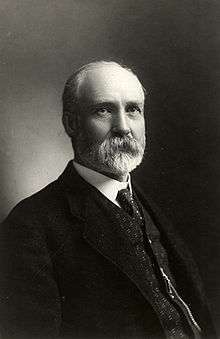Arthur Philemon Coleman
Arthur Philemon Coleman (April 4, 1852 – February 26, 1939) was a Canadian geologist and academic.
Arthur Philemon Coleman | |
|---|---|
 | |
| Born | April 4, 1852 |
| Died | February 26, 1939 (aged 86) |
| Nationality | Canada |
| Alma mater | Victoria College, University of Breslau |
| Awards | Murchison Medal (1910) Flavelle Medal (1929) Penrose Medal (1936) Fellow of the Royal Society[1] |
| Scientific career | |
| Fields | Geology |
Biography
Born in Lachute, Quebec, the son of Rev. Francis Coleman and Emmeline Maria Adams, he received his Bachelor of Arts in 1876 and Master of Arts in 1880 from Victoria College in Cobourg, Ontario. He received a Ph.D. at the University of Breslau in 1881.
Coleman joined the department of geology and natural history at Victoria College in 1882 as a Professor. From 1891 to 1901, he was a Professor of Geology at the School of Practical Science in Toronto. From 1893 to 1909, he was a geologist at the Bureau of Mines of the Government of Ontario. From 1901 to 1922, he was a Professor of Geology at the University of Toronto and was Dean of the Faculty of Arts from 1919 to 1922. From 1931 to 1934, he was a geologist with the Department of Mines of the Government of Ontario.
In 1898, Coleman lead a field expedition with the intent of surveying resources, along with the Geologist George Mercer Dawson and the famed Anarchist, Peter Kropotkin. Kropotkin gave his credit to Coleman, writing he was "well acquainted with the mining region of Central Canada."[2]
In 1907, Coleman inferred a "lower Huronian ice age"[3][4] from analysis of a geological formation near Lake Huron.
Coleman was elected a Fellow of the Royal Society of Canada in 1900 and was its President in 1921. He was awarded the Murchison Medal of the Geological Society of London in 1910 and in 1928 was awarded the Royal Society of Canada's Flavelle Medal. In 1902, he was elected President of the Royal Canadian Institute and in 1910, he was made a Fellow of the Royal Society.[1] In 1915, he was President of the Geological Society of America.[5] In 1929, he was appointed Honorary Vice-President of the Royal Canadian Geographical Society.
He was author of:
- Reports on the Economic Geology of Ontario (1903)
- Lake Ojibway; Last of the Great Glacial Lakes (1909)
- The Canadian Rockies: New and Old Trails (1911)
- Ice Ages, Recent and Ancient (1926), and was co-author of Elementary Geology (1922).
- The Last Million Years (1941) Edited by George F. Kay
He achieved the first ascent of Castle Mountain in 1884, and in 1907, he was the first white man to attempt to climb Mount Robson. He made a total of eight exploratory trips to the Canadian Rockies, wholly four of them looking for the mythical giants of Hooker and Brown.
Coleman was awarded the Penrose Medal of The Geological Society of America in 1936.[6]
His younger half-sister was poet Helena Coleman; the two shared a home in Toronto for much of their adult lives.
Legacy
Mount Coleman and Coleman Glacier in Banff National Park are named in his honour.[7]
Lake Coleman, a lake with a higher water level, in the same basin as Lake Ontario, is named in Coleman's memory.[8] The lake, like Lake Iroquois and Lake Scarborough, is a product of the melting and drainage, of the Laurentide Ice Sheet.
References
- Watts, W. W. (1940). "Arthur Philemon Coleman. 1852-1939". Obituary Notices of Fellows of the Royal Society. 3 (8): 116–126. doi:10.1098/rsbm.1940.0011.
- Peter Kropotkin (March 1898). "Some of the Resources of Canada". The Nineteenth Century. pp. 494–514.
- Coleman, A. P. (1907-03-01). "A lower Huronian ice age". American Journal of Science. s4-23 (135): 187–192. doi:10.2475/ajs.s4-23.135.187. ISSN 0002-9599. Archived from the original on 2018-06-02. Retrieved 2019-05-23.
- Bekker, Andrey (2014). "Huronian Glaciation". Encyclopedia of Astrobiology. pp. 1–8. doi:10.1007/978-3-642-27833-4_742-4. ISBN 978-3-642-27833-4.
- Fairchild, Herman LeRoy, 1932, The Geological Society of America 1888-1930, a Chapter in Earth Science History: New York, The Geological Society of America, 232 p.
- Eckel, Edwin, 1982, GSA Memoir 155, The Geological Society of America — Life History of a Learned Society: Boulder, Colorado, Geological Society of America Memoir 155, 168 p., ISBN 0-8137-1155-X.
- Place-names of Alberta. Ottawa: Geographic Board of Canada. 1928. p. 36. Archived from the original on 2018-09-29. Retrieved 2019-05-23.
- Wayne Reeves; Christina Palassio, eds. (2008). "HTO, Toronto's Water from Lake Iroquois to Taddle Creek and Beyond". Coach House Books. ISBN 9781552452080. Retrieved 2018-09-29.
Bibliography
External links

- Works by Arthur Philemon Coleman at Project Gutenberg
- Works by or about Arthur Philemon Coleman at Internet Archive
- Works by A. P. Coleman at Faded Page (Canada)